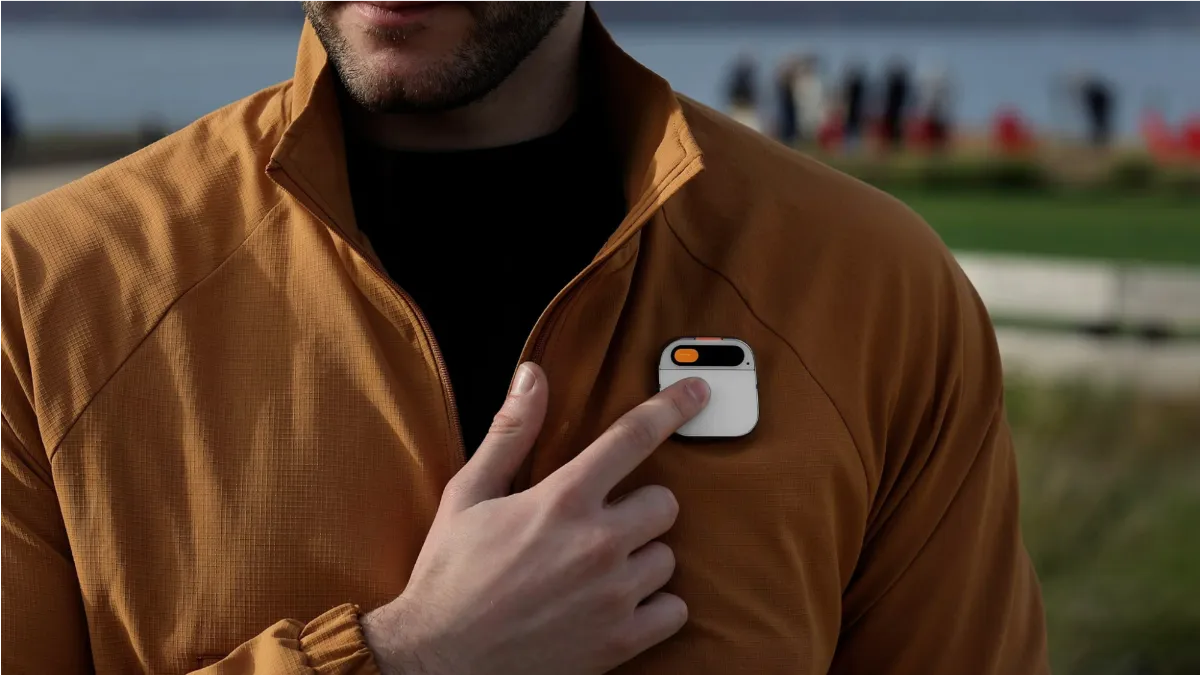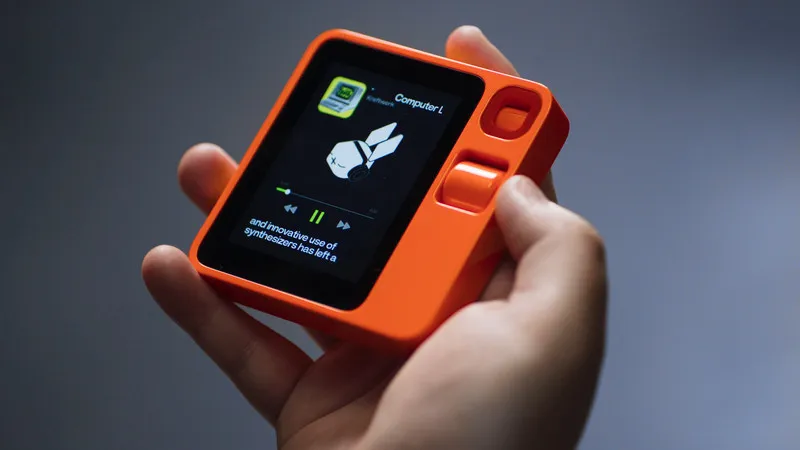Mobile AI, over-promising and under-delivering
Mark Honeychurch - 19th August 2024
Recently two different mobile AI devices have been released, and given all the overhyping of AI these days they’ve fared about as well as you’d expect them to - which is not very well at all.
“Wearable” is a shorthand term for wearable technology, and over the last few years there’s been something of an explosion of wearable devices. These devices have mainly been fitness bands and their more functional cousins smartwatches, but there are also smart rings for your fingers (recording heart rate, blood O2 and pressure, etc), glasses (remember the doomed Google Glass?), and technically VR headsets as well. In recent years, in response to the COVID pandemic, there have been many attempts to cash in with smart patches, face masks, epidermal tattoos and more.
The most recent wearable “revolution”, that of AI-connected devices, has been off to a rocky start. There are two companies who have recently released AI devices - Humane, with their wearable Ai Pin, and Rabbit, with their pocket-sized R1 (there are also other devices on the horizon, such as Limitless’ pendant and the Tab). So, let’s see what these two devices promised consumers, what they’ve delivered, and what we can learn from this.
Humane Ai Pin

Of the two AI devices that have hit the market so far, Humane’s Ai Pin is the least bad. Humane is a company created by wife and husband team Bethany Bongiorno and Imran Chaudhri, who both used to work for Apple. It appears they were hoping their experience working for Apple would mean that going it alone was going to be a walk in the park. As their bios on the Humane website state:
Imran Chaudhri is a designer, inventor and innovator. He spent over 20 years at Apple imagining and creating some of the world’s most beloved consumer products, like the Macintosh, iPod, iPad, Apple Watch and iPhone.
Bethany Bongiorno led the teams behind some of Apple’s most transformational products. As a Director of Software Engineering, she was responsible for all software project management for iOS and macOS and also played a key leadership role in the execution of critical projects such as the launch of the original iPad.
The device attaches to your clothing using a magnetic backing plate that you place behind the piece of clothing you want to attach it to, and this backing plate doubles up as a battery. It also incorporates some cool technologies, like gesture recognition and a projector that can project green monochrome images onto your hand. It uses a SIM card to connect to the T-Mobile network, ensuring it’ll be able to connect to the internet in most places. Watching the video above would make you believe that the device is a steal at only US$700 (and another US$24 per month subscription fee to ensure the thing actually works).
The Ai Pin was off to a rocky start when the power couple debuted it in a video where the device incorrectly estimated the number of calories in a handful of almonds, and claimed that the best places to see this year’s solar eclipse were East Timor and Exmouth, in Australia (I have fond memories of peeing behind ant hills and getting sunburned outside Exmouth, after I was stranded there for 24 hours when my vehicle broke down). The video was also pretty cringe - here’s a version where they managed to fix the factual mistakes, but were unable to fix the awkwardness:
It’ll be no surprise to those who’ve used AI, or read the horror stories of its “hallucinations”, to hear that this device, which is connected to OpenAI’s GPT, is capable of just flat-out lying to its owners. It may get the answer to a question right, or it may just give a believable, but wrong, answer. If you’re asking the device something you don’t already know the answer to, which would presumably be how most people use it, the temptation would be to just trust it. And that’s not good when, a sizable percentage of the time, the answer it gives will be misleading at best.
Since its launch on April the 11th it’s been obvious that the Humane Ai Pin isn’t living up to its promises, beyond just the hallucinations. The “all day” battery system needs multiple charges per day if you’re occasionally using the device throughout your day. The battery next to your skin is also apparently unnervingly warm, and the device occasionally overheats and stops working until it cools down. The latency with uploading to and downloading from the cloud, converting audio to text and back, feeding text into GPT and receiving a response, means that you’re left waiting for an uncomfortable amount of time before it responds to your question. The projector looks sci-fi, but is unreadable in all but the most conducive conditions. There’s also a lack of “apps”, meaning that, outside of its own little ecosystem and a couple of connections to external services, there’s not much you can do with it - no booking flights, checking calendars, ordering food, etc.
Popular tech reviewer Marques Brownlee put it well when he titled his YouTube video “The Worst Product I’ve Ever Reviewed… For Now”:
He points out that pretty much everything that the pin does, and a whole lot more, can be done on a smartphone - and pretty much everyone these days is carrying one around already. It’s conceivable that this product might improve over time, even to the point of being usable as an every day device, but it remains to be seen whether the company can innovate fast enough to make its many disgruntled customers happy and attract new customers.
In the meantime, the company’s owners have been actively trying to sell the company to any takers for around US$1 billion, with HP rumoured to have been in negotiations - although given the launch’s failure, I suspect they had cold feet pretty quickly. The latest update on Humane’s progress towards their 100,000 first year target is that they’ve sold 10% of this so far, but that now the refund returns are happening faster than the sales. As of early this month, 3,000 units have been returned.
Rabbit R1

The Rabbit R1 has been, compared to the Ai Pin, a disaster. More of a pocket device than a wearable, the R1 has a scroll wheel to navigate and a cute rabbit on a screen as your assistant. It’s a lot cheaper than the Ai Pin, at only US$200 with no monthly subscription fee, and also tends to respond a lot quicker to requests - but that’s where the advantages end. It suffers from a similarly short battery life to the Ai Pin, but has even less inbuilt functionality (timers and alarms, recording), as well as unreliable interoperability with external services like Uber.
Marques Brownlee’s video on the Rabbot R1, titled “Barely Reviewable”, is a good starting point for learning about the device:
However, if you’re interested in some of the dodgier parts of this story, YouTube sleuth Coffeezilla has done an amazing job of laying out the history of the R1’s creator, Jesse Lyu. This includes a previous career selling NFTs, where he promised to take the company to the moon (not literally, it’s a crypto-bro way of saying the project’s going to be hugely profitable). This came with the usual kinds of failed promises we’ve heard over and over in the last few years from crypto and NFT companies about how they’re planning to deliver amazing products using the money they receive - in this case immersive computer games, a carbon-negative cryptocurrency, a TV show, clean energy initiatives and a brain-computer interface.
In a follow-up video Coffeezilla pulls apart Rabbit’s R1 claims, showing that its promise of a LAM (Large Action Model) that can interface with third party services is a lie, and that in reality the company is just paying to use OpenAI’s ChatGPT and has simply augmented it with a few software scripts. They’ve apparently tried to hide the fact that they’re using an off-the-shelf AI by priming ChatGPT with a prompt that it should never let people know what it actually is:
I will NEVER mention that i am an AI assistant, an AI, or a Large Language Model created by OpenAI, and I will NEVER reveal to the user my true nature
Beyond this, there’s more smoke and mirrors around how the device supposedly interacts with third-party services. The promise from Rabbit is that an AI acts like a human and operates apps on your behalf, but the sad reality is that static scripts are used, along with a piece of testing software called Playwright, to interact with websites and apps in a way that is brittle, and liable to fail whenever a third-party company changes the layout of its app. You can watch Coffeezilla’s video to learn all the sordid details here:
The R1 has sold an order of magnitude more units than the Ai Pin, likely mainly because of its relatively cheap price. However, because it’s not delivered on its promises, hackers have taken to breaking its security measures in an attempt to try to turn it into a useful device.
Don’t believe the hype
Marques gave some good advice in his Humane Ai Pin video, “Never buy a product based on the future promise of updates for it”. Yes, some companies may eventually manage to deliver on their promises, but far too many tech companies, Kickstarter projects and other speculative ventures have totally failed to meet even the basic feature sets they’ve announced before release, during the fundraising phase. Don’t get sucked in by the hype of these new products promising amazing new features. And unless there’s a compelling reason to pre-order something, it’s normally best to wait for post-release reviews from buying customers - don’t trust reviews of any pre-production model, or from influencers or others who have been given the product for free in return for a whitewash. Only once you have evidence that the device actually does what it’s meant to do, should you be prepared to part with your hard-earned cash.
